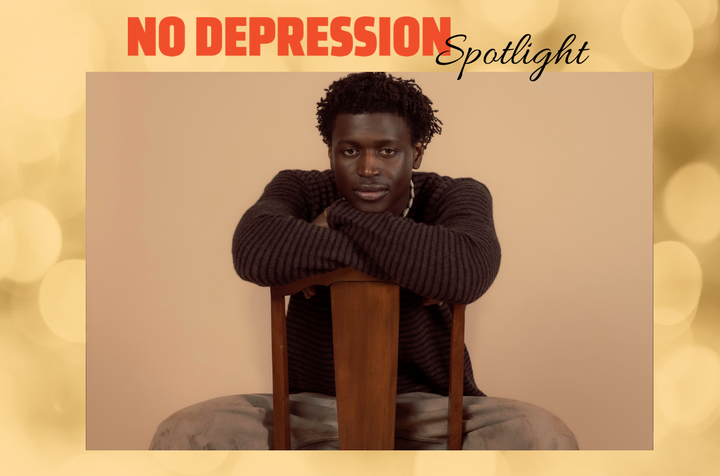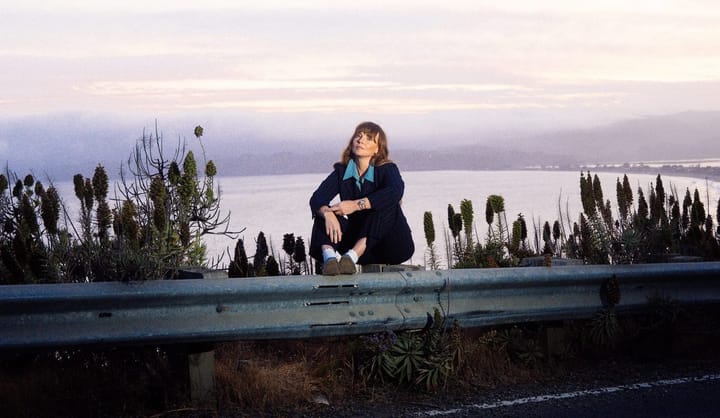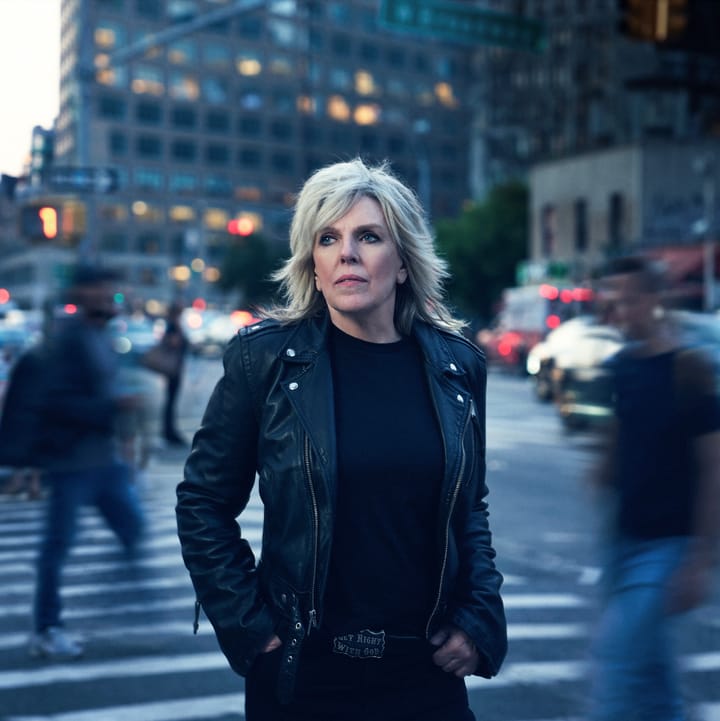"This record isn't like three years of therapy for me. I look back on Barricades and I can hear every moment in there of those three years prior to bringing that record out -- that struggle of getting through that time, and that happiness of having that baby and all of those sorts of things."
Here's her dirty little secret: Kasey Chambers hardly even plays that acoustic guitar. "Onstage I can't really live without one because I feel a bit naked," she says, calling from tomorrow in Australia. "Even when I'm not playing I have one strapped to my back." And, although she says an acoustic is always the center of her songwriting, she never plays it in recording sessions.
So perhaps it shouldn't be especially surprising that there's no acoustic guitar on Carnival, her new album on Warner Bros. The introduction of keyboards may be a better metaphor for the new approach she explores. Australian rockers from Midnight Oil, Powderfinger and You Am I fill in spots that might've featured Lucinda Williams or Buddy Miller on previous releases, and while Chambers' vocals retain their indelible country tinge, there's nary a twang in the whole Carnival collection.
Carnival discards the template of Chambers' four previous releases, which established her as Australia's premier country artist while simultaneously propelling her to the top of that continent's pop charts, and establishing a promising foothold in the United States. But her new sound is not about subtraction so much as addition, or substitution.
Instead of a radical departure, Carnival is more like a visit to an opposite shore of Chambers' proven ground: vivid, catchy songwriting delivered with a unique and compelling voice. "I had a little inkling in the back of my mind that maybe this was the record that I might want to slip out of my comfort zone," Chambers says.
She credits her brother and producer, Nash, with dragging her out when the slip didn't come easily. "He said, 'Maybe we should try some different things; maybe that means a new producer or something like that.' I said, 'Well, maybe we could both do it'" -- an indication that changing producers was a little further than she cared to stray.
"The thing is, my brother gets to produce a lot of different locals as well, so he does get to step out of his comfort zone, so it's a little easier for him to do that," she says. "I really didn't even know what sort of record I wanted to make; I just wanted to try a different approach. I've always had a rock song on the record and some blues songs and things like that, but I think that this one has less of the country stuff. It wasn't a conscious decision; we just decided to try a different approach and that's sort of how it turned out."
Chambers' duet with You Am I frontman Tim Rogers is a telling, if perhaps extreme, example of how it turned out. The attitude of "I Got You Now" is a growling, fiercely dominant contrast to the veiled irony of "Am I Pretty Enough" (the Australian radio hit from Chambers' 2001 Barricades And Brickwalls): "I got your mind/I got your soul/I got you held up like a prisoner cryin' blind/But I got you in control/Baby let's rock and roll." Chambers and Rogers deliver the song as a call-and-response over a driving rock beat worthy of the Cramps; the outro is a feedback meltdown.
"I wrote that song with that kind of sounding vocal in mind," Chambers says, "but I didn't really know who owned that voice. I wanted it to be kind of dirty and gritty and technically not perfect and kind of sounding like you've smoked too many cigarettes or something. It was actually my husband [singer-songwriter Shane Nicholson] that said, 'You know, it's Tim Rogers from You Am I. You keep describing this person and that's the person that comes to mind, so you should get him.' [It] just makes more sense having Tim on it because it's quite a heavy song for me to play."
"It's A Hard Road", Chambers' duet with Bernard Fanning of Brisbane's arena-rock expansive Powderfinger, is more in the nature of a rock ballad, but its imagery is despairing, almost gothic: "There's blood in the kitchen/In the shape of a sin/There's a ship in the water/But it ain't comin' in." Fanning's soulful vocals match Chambers' emotional delivery, weaving and cracking in the harmonies with the Gram Parsons sensibility he revealed in his recent solo release Tea & Sympathy. The song opens with a simple keyboard part leading into a downbeat arrangement, anchored by Jeff McCormack's imaginative bass part and highlighted with a short harmonica break by Fanning.
Chambers had worked with Fanning before and had discussed with Rogers the possibility of working together at some point, so those two were at least within reach of her comfort zone. Not so with Midnight Oil's Jim Moginie.
"I'd never met Jim before," she says. "Working with him in the studio that first day was really weird for me because I usually have to know someone really well or be blood relations to them to feel comfortable working with them." (Chambers' father Bill is her regular guitar player, but he sat this project out.)
"I'm not even really a Midnight Oil fan so I hadn't grown up listening to Jim, [but] he met my brother Nash, and my husband knew a lot about how he played, and he suggested, 'You know, he would be great on this record, just take my word for it.' That's part of this record -- let's take some chances and do some different things -- and he was amazing.
"He just thinks in such a different way than I do and yet he understands the sort of music that I was trying to make. And playing with a keyboard player! I've had a piano on one track on one of my records, but to actually be playing in a band with a keyboard player, I've never done it. He played...all these different sounds that I hadn't really heard along with my voice before. I didn't even realize that it would be that different, but it was, and it was really exciting!"
Moginie contributed piano, electric guitar and mandola parts, all surprisingly subtle and integrated. Other surprises lurk in the reggae lurch of the title track; the sultry, jazzy, blues drumming on "Light Up A Candle"; and the dance beats in "Surrender". But even though the character of the album's instrumentation runs more to rock 'n' roll, brother Nash stayed in the zone with his production. Arrangements remain well in the background to Chambers' guileless, child-woman voice, the raw emotion of her delivery, and the captivating imagery of her lyrics.
Perhaps the most radical and risky aspect of Chambers' approach to Carnival was her willingness to tinker with her songwriting. "I actually wrote three songs while I was in the studio, which is just really different for me," she says. "'Nothing At All' [the sprightly, stream-of-consciousness first single], 'Don't Look So Sad' and 'Surrender' were all written in the last two days of recording and recorded on the day they were written."
Carnival songs also reflect Chambers' first forays into pretending. "This record isn't like three years of therapy for me," she says. "I look back on Barricades and I can hear every moment in there of those three years prior to bringing that record out -- that struggle of getting through that time, and that happiness of having that baby and all of those sorts of things. That's what all my records are. And I just didn't want to do that with this record.
"I just thought, you know what? It doesn't matter if they're not about me, or it doesn't matter if every line doesn't depict some life-changing moment for me or some emotional breakdown or something. I just went, 'Let's just see what song falls out,' and I only went ahead and worked with the ones I really loved.
"There are a couple different ones. 'Sign On The Door' [loaded with religious references to signify redemption] is specifically about me being in love. 'Don't Look So Sad' is a song that I wrote for a friend of mine who was going through a really hard time at that point. But generally the record is songs that just fell out. I'm only beginning to analyze them now, what they're about."
It's not that Chambers didn't have truer stories to tell. She had already generated more than an album's worth of songs based on painful recent events in her life. As a first-tier celebrity in Australia, her private life is an open book, so the disintegration of her 2002 marriage to actor Cori Hopper, with whom she has a four-year-old son, was a very public one.
But, Chambers explains, "By the time I made this record, I was in love again and I was married [in December 2005], and I have a great relationship with my ex. I just didn't want to go back and have this album be the big heartbreak album. I know that's what everyone was expecting here in Australia, but...I wanted this record to show a little bit more of my contentment of where I am now as a person. You know, I'm married, I'm a mother, I'm over 30, and I have a successful business. I'm just a more content person than I was on the last record [2004's Wayward Angel]."
Chambers' unique upbringing no doubt influences her resilience through life's ups and downs. It probably also explains some of her present contentment with being settled in. She grew up with the galaxy for her bedroom ceiling as her father supported the family by fox hunting in Australia's vast Nullarbor Plain (Nullarbor means "no trees"). For seven months each year, from the time she was an infant until she was 10, the family moved nightly in search of foxes, living mostly on whatever water and game the land provided. As a youngster, Chambers helped hunt rabbits and turkeys, and says she's still fond of kangaroo meat.
Mother Diane gave Kasey and her brother Nash the nomadic equivalent of "home-schooling." For entertainment, father Bill played guitar and the family sang together around the evening campfire. The repertoire included hymns and Australian "bush ballads," but it leaned more heavily toward American country and folk music, from Jimmie Rogers and Hank Williams to Gram Parsons and Townes Van Zandt.
The family eventually settled in a southern coastal town, where Nash and Kasey attended traditional high school and their father earned a living as a commercial fisherman. But music was still central to their lives and they were soon camping under the stars again, performing on the road as the Dead Ringer Band. They released their first EP in 1992 and followed with four full-length releases, the last in 1998.
By that time, Kasey had become the undisputed star of the Dead Ringer Band, and EMI signed her in Australia as a solo artist, releasing her debut, The Captain, in 1999. It won an ARIA award, the Australian equivalent of a Grammy, for Best Country Album, and launched her career in the United States when Warner Bros. picked it up. Barricades And Brickwalls, released in 2001, won ARIAs for Best Country Album, Best Female Artist and Album Of The Year. Chambers again won the Best Female Artist ARIA in 2004 for Wayward Angel, and she's been nominated for the same award for Carnival, which is already double-platinum in Australia.
As much as things have changed, in some ways they remain the same: Chambers is still on the road with the family. Nash engineers her sound; Diane handles the merchandise; Bill is her touring guitarist. "I still love going on the road...because all of the guys in my band and all the people I work with; it is like a big family," she says. "I take my son with me and my husband opens up my shows for me. My son actually loves coming on tour with me. In about a year and a half he'll start going to school, so we probably won't travel as much as we have been."
Even now, she says, "I don't tour quite as much, but that's mainly because I just enjoy being at home a little bit more. I have a house that I love being in and I just like that whole lifestyle a little bit more than I used to."
Still, she's seen enough to know she hasn't seen it all. "The thing is, no one ever goes through life without dramas," she says. "I'm sure more dramas are going to happen and I'm sure I'll go through another 'therapy' album yet.
"But at this point, I just want every album to reflect sort of where I am. This one definitely does."
ND contributing editor Linda Ray lives in the Arizona Outback, eschewing jackrabbit, javelina and rattlesnake meat.




Comments ()